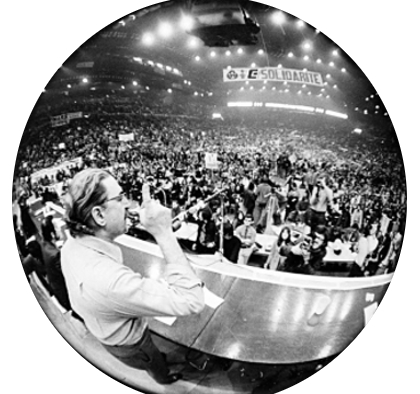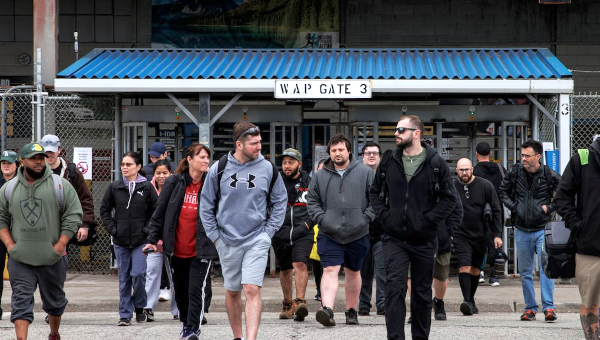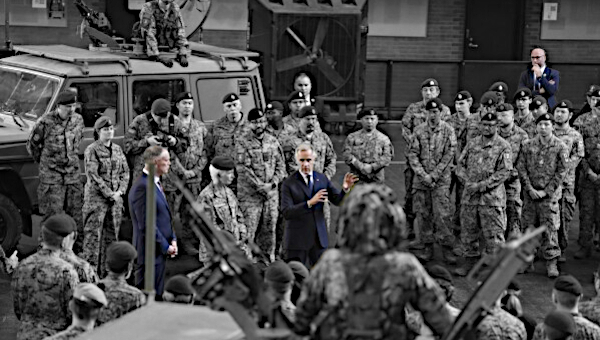The Harper government has dragged Canadian politics to a point where intelligent criticism is difficult. Things are almost too obviously bad.
 On an international stage, it was enough to see the smug chuckles that Binyamin Netanyahu and Avigdor Lieberman exchanged as Harper delivered his speech to Israeli parliament this January, urging Israel’s leadership to stay the course toward regional wars (see the expressions at 18:24 of this video, for example). Harper had the air of a Western diplomat from the 1960s, fresh from watching Exodus and eager to rehearse the story of Zionism’s “blooming deserts.” He then held a joint press conference with Netanyahu to explain himself. True, Canada may today be isolated on the far, anti-Palestinian fringe of world diplomacy. But, Harper insisted, isolation in the face of world opinion is nothing less than a “fundamental Canadian ethic.”[1]
On an international stage, it was enough to see the smug chuckles that Binyamin Netanyahu and Avigdor Lieberman exchanged as Harper delivered his speech to Israeli parliament this January, urging Israel’s leadership to stay the course toward regional wars (see the expressions at 18:24 of this video, for example). Harper had the air of a Western diplomat from the 1960s, fresh from watching Exodus and eager to rehearse the story of Zionism’s “blooming deserts.” He then held a joint press conference with Netanyahu to explain himself. True, Canada may today be isolated on the far, anti-Palestinian fringe of world diplomacy. But, Harper insisted, isolation in the face of world opinion is nothing less than a “fundamental Canadian ethic.”[1]
If the Harper government’s Palestine diplomacy has marked its drive toward a sharpened imperial role for Canada – aligned, indeed, not merely with the reigning U.S. administration but with its Republican opposition – it is of course in Afghanistan where Canadian military participation has been most direct. And as the mission there formally concludes this month, mainstream commentary provides yet more cause for alarm.
In the Globe and Mail, that faithful organ of Canada’s centrist establishment, Jeffrey Simpson writes that Canada “lost the war, but won the battle” (March 15).[2]
Simpson reflects on the results with some satisfaction: “Canada having taken a pass on the war in Iraq,” the imperial division of labour demanded that it “step up in Afghanistan.” The situation in Afghanistan is bleak, he admits; but who in the Canadian establishment really cared about Afghanistan in the first place? “If Canada’s involvement in that faraway place accomplished anything, it was to reconnect the Forces and the general public.” Many of those championing the mission wished above all to strengthen the
war-readiness of Canadian political culture, suggests Simpson, and “these domestic hopes” were fulfilled.
Uphill Battle for the Anti-War Movement
The decades ahead promise an ugly international convergence between military intervention and ecological crisis. And in all of this the Canadian state is being prepared to play the worst conceivable role. Developing a truly relevant anti-imperialist opposition within
Canadian society, let alone a decisive one, is unlikely to be easy.
In the Harper government there have coalesced many of the worst elements in Canadian politics: the shock troops of Ontario’s “Common Sense Revolution,” rightist populists, Alberta oil money.
Challenging both their outrageous record and a mainstream parliamentary opposition that often differs from the government only in degrees is sure to be an uphill battle.
Genuine success may not be possible for our opposition movements. But even well short of real “victory” – say, significant social transformation of the kind that many of us would like – one can imagine plausible gains. A level of domestic political disruption that could at least undermine the government’s capacity to pursue destructive interventions abroad would be a very good start. Figuring out how a base equal to this task might be developed is an obvious priority for the left.
While from Alberta to Ontario, the conservative base of support for imperialism has indeed strengthened, the base of potential support
for anti-imperialism is arguably strongest in Québec. And simply put, the most plausible scenarios for successful cross-regional
agitation and action centrally involve Québec’s left sovereigntists, or at any rate Québec-based movements with strong sovereigntist inclinations. This is important to bear in mind amidst the renewed discussions of sovereignty triggered by the current elections cycle. The rhetoric from the federalist establishment has been predictable: the Maclean’s editorial board, for example, is urging that a “popular front” of Canadian political forces be prepared to combat any sovereigntist challenge (March 24).[3] For left and anti-war forces, in contrast, a surge of the
right kind of sovereigntist politics in the years ahead is positively
to be hoped for. There is good reason to orient toward this possibility, and to meanwhile get in the habit of rejecting the knee-jerk defence of Confederation.
Canada and the “Anglo-Saxon bloc”
One symptom of left weakness is fragmented political communication between generations. For example, I don’t think that many leftists
dispute that what happened in Québec of the early 1970s was one of the strongest upsurges of popular anti-imperialism in the history
of the Canadian state – an upsurge including close (if sometimes contradictory) identification with Third World liberation movements,
a fact that Sean Mills usefully highlights in his recent book on the period. Through much of Canada, however, discussion of the
legacy of this upsurge, and of the enduring possibilities it may point to, remains limited.
In the absence of any real continuity in left discussion throughout Canada, it is not only that many of us approach the question as beginners, but also that our analysis of Québec inevitably borrows
from conventional Canadian wisdom. In too many discussions of sovereigntist politics on the Anglo Canadian left, ideas rooted in
left critique and in Canadian nationalism thus uncomfortably intermingle.
Concerning sovereigntist politics, I’m not in a position to say much more than the obvious. Below, I’ll get to stating some of what
seems obvious, important, but often neglected in discussions among Anglo leftists. First, though, it makes sense to re-affirm a basic point: the primary enemy of anti-imperialists in this country really ought to be the federalist establishment and its international WASP alignments.
Samir Amin and Ali El Kenz single out what they call “the Anglo-Saxon bloc of peoples” as an element of international politics
specifically drawn toward isolated imperial belligerence.[4] They do so for good reason. The 20th century opened with, in Britain,
the likes of Balfour and Chamberlain babbling on about the virtues of
global Anglo-Saxon “race patriotism,” while from the United States, president Roosevelt chimed in with praise for that special
“kind of colonizing conquest” of native lands that the U.S., Australia, and Canada had pursued, and which, in the eyes of this
butcher of the Philippines, set them apart from their Western rivals.[5]
After World War II, the imperial enthusiast Winston Churchill returned to this theme in his famous speech at Fulton, Missouri, urging Anglo-American alliance (1946). It was through a “fraternal association of the English-speaking peoples” that post-war British power could best be exercised, declared Churchill, specifically identifying the recently cemented Canada-U.S. military relationship as a model that should be extended to the rest of the English-speaking West.[6]
The 20th century then ended with what Amin and El Kenz call “the second Gulf war – that of 1998, which did not take place.”[7] Part of what prevented this Anglo-American bombing of Iraq (Operation Desert Fox) from developing into a broadened war was European unwillingness to go along with it. France joined China and Russia at the Security Council in responding with a call to lift the sanctions on Iraq and to fire the Australian diplomat then heading the sham supervision team overseeing them. As British and American bombs dropped, Canada’s Chrétien Liberals, loyal to a “liberal internationalism” whose gaze has rarely extended beyond London and Washington, supported the aggression.
Churchill, who after WWI first introduced Iraq to aerial bombing,[8] would be proud to see how his favourite “fraternal association” has endured.
The basic alignments are deeply rooted. And Canada’s institutionalized association with Anglo-American power, including participation in an
“Anglosphere”-specific system of military interoperability (anchored by the United States and including Britain and Australia),
is by now far-ranging.[9] For their part, the Harper Tories proudly proclaim this
identification in the most bizarre ways. As I wrote last December (see “Palestine in Canadian Politics”), Harper himself, proudly anachronistic, has all but openly declared
himself a 21st-century British “race patriot.”
The Distinctive Potential for
Anti-War Agitation in Québec
It’s a little amusing to read the academic take on Canada’s membership in the “Anglosphere.” A member in good standing, surely. But unlike the Australian state, whose imperial politics have often been more brazen, Canadian confederation encompasses the Québécois, with their disproportionate “predilection for nonviolent options.” In public opinion polling, for example, we know that Québec “has long skewed Canada’s national average to the left on many issues, including world affairs.”[10]
Concerning war, the pattern is well established. Specifically Québécois (or anyway, Francophone Québec-based) anti-war sentiment has been an
important factor in Canadian politics since at least the turn of the 20th century, when Canadian troops fought under the British flag in
South Africa.[11] Major conscription crises in Québec in turn accompanied both world wars. There is an element of continuity between this early history and, to take a contemporary example, the fact that Montréal was the site of the largest demonstrations in Canada opposing the 2003 invasion of Iraq; but it was of course in the 1960s, and especially the early 1970s, that this tradition assumed its most promising dimensions.
The emergence in those years of a sovereigntist politics avowedly identified with anti-colonialism responded to a reality of structural racism. True, the historic brunt of Anglo-Canadian racism was not borne by the Québécois – from the dispossession of indigenous peoples from coast to coast to the rioting against East Asian immigration in British Columbia, racism was sharpest across a clearer “colour line.” Still, sovereigntist rebellion against continental North American structures of “White Anglo-Saxon racism,” to borrow the formula of one leading sovereigntist militant, did speak to a certain truth.[12]
Indeed, establishment commentators had themselves long suggested the point. Consider one of the classic books positioning Canada in the post-war
world, J.B. Brebner’s North Atlantic Triangle (1949). Noting that Canada was entangled not only with the British Empire but
also with the United States, Brebner emphasized that the North American neighbours were, after all, “of the same human stock except for their proportions of French and Negro elements.”[13] The title of Pierre Vallières’s sovereigntist classic, the autobiography Nègres blancs d’Amerique (1968), may be cringe-worthy, but it wasn’t breaking altogether new territory.
One can think what one will of analysis considering Québécois history a history of “the colonized among the colonizers.”[14] I won’t review the debate at much length here. Nor is this the place for statistics on the distribution of Canadian wealth and power; in this as in other respects, Sean Mills’ book provides nuanced guidance.
My point is simply to note an obvious fact: the syndicalist and anti-colonial politics that developed largely around this analysis
were extremely important. Moreover, their legacy endures. This contrasts with, for example, the United States, where former New Left
gains at the level of popular culture have been more thoroughly rolled back by a decades-long campaign waged by established power
against the “Vietnam syndrome.” By North American standards, syndicalist militancy and a certain sympathy with international independence struggles today remain comparatively widespread in Québec.
To be sure, contradictions abound. The history of left sovereigntist identification with Third World liberation left a constructive legacy; but as Vallières himself conceded amidst the broadened anti-racism of the 1970s, Québec belongs not to the Third World “but
to the privileged West.”[15] The project for Québécois sovereignty is often described as having
shed “French-Canadian” religious and ethnic identification in favour of a political platform based on language and territory; but the ethnic element, we are nowadays constantly reminded, has remained a stubborn underlying force.
Today’s Parti Québécois embodies the worst of all of this – more on which below. But strategically fighting them requires doing
more than lending a left spin to standard federalist tropes. The strength (and especially the potential strength) of allies within
Québécois anti-war or syndicalist circles, like the 2012 student revolt, cannot neatly be separated from sovereigntist politics. And
respectful engagement with these politics will be a necessary ingredient of effective coordination with these movements.
Consistency and Strategy in Thinking About Settler Colonialism
A reaction to sovereigntist politics that one hears from many Canadian leftists is the insistence that, since Québec is a society produced
by settler colonialism, sovereigntist politics are nothing more than
settler politics. And the tension between Québécois territorial claims and indigenous land rights is indeed a critical issue. It is,
however, an issue that has to be approached with seriousness and consistency.
Really, this discussion applies across the western hemisphere. Given the depth of colonization and genocide
throughout the Americas, cases of settler politics are not the
exception but the rule. This is a fundamental fact, and one can take
it in any number of political directions. It is possible to suggest
that indigenous demands and struggles need to be central to any
progressive struggle worthy of the name. On the other hand, it is
also possible to let established power leverage the point selectively as an instrument to attack troublesome social projects.
Taken to an extreme, the second route can be a wonderful convenience. In principle, the butchery of Chilean democracy by a U.S. proxy military
could be written of as an “intra-settler” matter; Venezuela’s Bolivarian project could be dismissed as nothing more than another settler colonialism with regional ambitions.
The point isn’t hypothetical. Recall that it was no less a champion of indigenous rights than Ronald Reagan who righteously declared that
Nicaragua’s Sandinista government was responsible for a “campaign of virtual genocide against the Miskito Indians” (1985).[16] Nearby, the Reagan administration had just overseen some of the late 20th century’s worst atrocities against indigenous people, the systematic slaughter of Mayans in Guatemala’s Ixil region.[17] But contempt for indigenous rights made it all the easier to pay them lip service as a rationale for the administration’s Central America wars. That there were genuine problems with the Sandinista record makes the case all the more instructive.
Now let’s return to Canada, whose official national motto, “A Mari Usque Ad Mare” (From Sea to Sea), is a classic colonial declaration, and whose federalist press corps boasts
that special kind of commitment to indigenous rights that especially surfaces during discussions of Québécois sovereignty.
Needless to say, Canada is a state defined by colonial boundaries: of “Empire Ontario,” as its early leadership took to calling it; of British
Columbia, whose unceded indigenous territory was aggressively reserved for white settlement by riotous xenophobia against the
“yellow peril.” Québec, like the rest of Canada, and for that matter like Chile, Venezuela and Nicaragua, is also a settler-colonial construct.
Even an inclusive Québécois sovereigntist politics based on language and territory runs up against this contradiction. And surely the hack
leadership of today’s PQ can’t be trusted for a moment to address it constructively. But in opposing such enemies as the contemporary
PQ, a left sovereigntist line of attack remains an alternative to federalism. There is, after all, much political history within the movements triggered by the sovereigntist upsurge that works along this line.
Here a few quick examples will need to suffice. Consider the classic fusion between syndicalist militancy and sovereigntist consciousness
in the early 1970s, perhaps best represented at the level of
organization by the development of the Montréal central council of the Confédération des syndicats nationaux (CSN) as a left stronghold, and at the level of action by the strike wave across Québec.
Montréal’s CSN militants are better known for international solidarity work around issues including Chile and Palestine.[18] But their popular education material, at least, began to look in interesting ways at the place of indigenous anti-colonialism within
the framing of Québec’s history. Thus Léandre Bergeron’s Petit manuel d’histoire du Québec (1970), distributed largely through the CSN, situates attacks on the “Anglo-Saxon” record within a broader condemnation of Western racism and colonial histories.[19] There remain contradictions. There is, for example, a tension between Bergeron’s historical identification of structural racism against indigenous peoples as the primary reality – implicating English and French, rich and poor – and the way his working-class sovereigntist claims sometimes push this reality into the background. This engagement with indigenous politics was nonetheless constructive.
Sean Mills notes that such thoughts did ultimately translate into some action. For instance: by the early
1970s, it had become clear that the Québec government’s effort to assert authority in northern territories previously administered by
the federal government amounted to substituting one colonialism for another. Indigenous self-determination struggles for control of community education faced familiar obstacles. Recognizing this as “a
new incarnation of the same colonialist policy, except that French rather than English had become the language of assimilation,” writes Mills, “the francophone teachers of the region went on a two-month strke, fighting alongside the Inuit for the preservation of their cultural rights.” The report by the Québec teachers union (the CEQ) on this fight was titled, Le Nouveau-Québec, ou comment
des colonisés traitent leur colonie (1972). “Against the right of states to organize peoples,” it asserted, “we propose the right of peoples to organize themselves.”[20]
Or consider, as a final example, the Oka crisis of 1990. True, in much of Québec this was the occasion for vicious anti-indigenous racism. But this
was hardly ignored by credible left sovereigntists. Michel Chartrand – president of the Montréal central council of the CSN from
1968-1978 and a political icon until his death in 2010 (and indeed, since) – forcefully made the case for a politics of integrity at an August 1990 rally supporting Mohawk action. Of course the struggle was justified in employing any necessary means: “Après 200 ans,
qu’est-ce qu’il reste d’autre à faire pour défendre ton territoire que de prendre des armes?”[21] It was the deployment of the Sûreté du Québec that was criminal, the indigenous struggle that demanded organized support. Propaganda about dangerous militants among the Mohawks, Chartrand observed, was a shameful echo of the rhetoric of “communist
infiltration” with which earlier Québec governments had justified attacks on organized workers.
One can argue that even the kind of Québécois sovereigntist politics into which support for indigenous struggles is interwoven often retains a
colonial element. It does. But in pursuing this discussion,
seriousness and consistency are required, lest we find ourselves politically channeling Maclean’s or Reagan.
All of that said…
None of this takes away from the fact that the contemporary PQ leadership is a political enemy. We can leave to one side the original PQ
platform of 1970, whose demands ranged from major social democratic
reform to withdrawal from NATO; the same goes for its porous relationship with parts of the extra-parliamentary left in the years
that followed.[22] These are relics of the party’s past. For serious progressives, all
that remains of these hopeful elements is some co-optation of the willfully blind.
“… the Pauline Marois government has since 2012 dutifully played by the austerity hand-book.”
Just as, through the second half of the 1990s, the Lucien Bouchard PQ partnered with the Chrétien-Martin liberals in imposing a deepened
neoliberalism on Québec, the Pauline Marois government has since 2012 dutifully played by the austerity hand-book. Thus the austerity assault in Québec hardly ended with the electoral defeat of the Liberal Party, politically important as that defeat was.
And then there is of course the contemptible “charte xénophobe,” the Marois government’s poorly veiled attack on Muslim women
working in the public sector. The moral prestige of earlier Québécois fights against reactionary Catholic clergy is all well and good. But
its exploitation through this hollow debate on “laïcité” is transparent. This lamentably popular campaign is particularly damning
inasmuch as the people it targets (for example, immigrants from North Africa and Lebanon) would need to be centrally positioned in any halfway inclusive Québécois project framed around territory and language.
Against this backdrop, this month’s elections cycle furnished among the worst conceivable triggers for renewed discussion of sovereignty: the announced PQ candidacy of the billionaire media magnate Pierre Karl Péladeau. Péladeau, whose tycoon’s portfolio includes control of the Canadian right’s (Québec-bashing) media troll network, Sun News; Péladeau, the union-busting hack responsible for 14 worker lock-outs.[23] Buoyed by his sickening wealth, some sovereigntist rhetoric from Péladeau quickly had the media talking.
Indigenous leaders across Québec have responded with justified hostility. Ghislain Picard, Chief of the Assembly of First Nations of Quebec and
Labrador, has rightly insisted that any discussions of Québécois sovereignty that do not address indigenous land claims and non-negotiable rights to self-determination are illegitimate.[24] The established syndicalist camp, for its own reasons and despite its sovereigntist orientation, has also been horrified by the direction PQ politics are taking.[25]
And on we go. In Québec as through much of the world, these are times of austerity politics and resurgent racism. Still, it takes
more than Canada’s multiculturalist trimmings to obscure the fact that an anachronism of a British race patriot is stampeding around
the international stage on our behalf, or that the Canadian state is
today closely wedded to Anglo-American intervention forces. Self-satisfied criticism of Québec from this federal government’s electoral bases is an unseemly response to the status quo.
The potential for anti-war activity in contemporary Québec is for the time being largely unrealized. As the Harper government pursues
stepped-up military recruitment in Québec no less than elsewhere, figures at the centre of Canada’s political establishment are
asking an obvious question: “What are we doing with all these soldiers?”[26] Meanwhile in Montréal, for example, where the organized left is relatively strongest, the public bus system is plastered with recruitment posters that come down as easily as post-it notes – yet mostly remain undisturbed. Getting out of the current lull in anti-imperialist activity may everywhere be an uphill push.
In this fight, the enemy is without question not solely “Anglo-Saxon.” It was the imperial politics of Québec, courtesy of its francophone federalist establishment, that drove one of the
worst crimes of 21-century Canadian foreign policy: participation in the 2004 overthrow of Haiti’s elected government and in the
occupation that followed.[27] The French-Canadian elite, as sovereigntists like Chartrand regularly pointed out, always find their way to the wrong side of the barricades. Besides, Western Europe has long provided striking
reminders that even true alienation from Anglo-American power needn’t
preclude inventive overseas crimes. All in all, Québécois movements looking to challenge state criminals will rarely need to look far.
Still the basic fact remains: If a serious cross-regional challenge to Canadian state crimes is to be organized in the years ahead, Québécois movements will make up one of its leading elements. And coordination
will require respect for the political history from which they’ll take at least some of their inspiration and momentum. •





